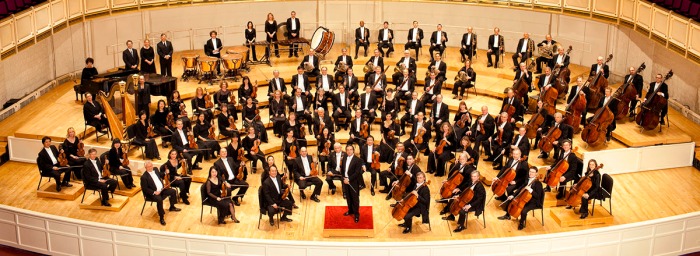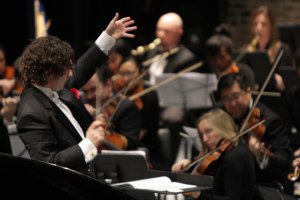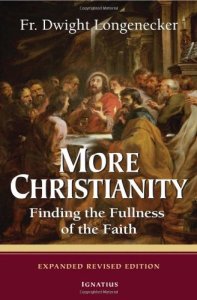Symphony (n): sounding together.
But for a long while they sang only each alone, or but few together, while the rest hearkened; for each comprehended only that part of the mind of Ilúvatar from which he came, and in the understanding of their brethren they grew but slowly. Yet ever as they listened they came to deeper understanding, and increased in unison and harmony.”
― J.R.R. Tolkien, The Silmarillion

“Then the voices of the Ainur, like unto harps and lutes, and pipes and trumpets, and viols and organs, and like unto countless choirs singing with words, began to fashion the theme of Iluvatar to a great music; and a sound arose of endless interchanging melodies woven in harmony that passed beyond hearing into the depths and into the heights, and the places of the dwelling of Iluvatar were filled to overflowing, and the music and the echo of the music went out into the Void, and it was not void.”
― J.R.R. Tolkien, The Silmarillion
There is something that is truly astounding about being Catholic: we are part of a faith symphonic! Catholics are called to a faith that resounds a beautiful symphony of love throughout all of creation. The word Catholic literally means: “according to the whole.” No instrument is left out and no note is less important than another. The composer of the symphony is the Lord and each of us has an instrument to play.
I began this post giving you a few quotes to chew on from one of Tolkein’s lesser known works: The Silmarillion. Most people know of his two books, ‘The Hobbit’ and the follow-up, ‘The Lord of the Rings’, since both of them were turned into a trilogy of movies. What I believe is revealed in the excerpts I have quoted above is how Tolkein sees the world as a Catholic Christian. On the surface, The Silmarillion would appear to just provide added story about events that lead up to ‘The Lord of the Rings.’ But, what Tolkein is really giving us is a deeper philosophical and theological foundation to the world of Middle Earth.
This is what distinguishes the Catholic vision from the myriad of Christian denominations that emerged after the dissent of Luther and the progeny of protestant groups. Every denomination in some way fails to “consider the whole”. There is some notes that either have to be omitted because of a fear that other notes, that are deemed more important, will be missed. Or certain notes have to be played faster, louder or more frequently for fear of the presence of other notes. In contrast, with a symphony, there is balance and harmony. Not cacophony.
Truth Symphonic
“In his revelation, God performs a symphony, and it is impossible to say which is richer: the seamless genius of his composition or the polyphonous orchestra of Creation that he has prepared to play it. Before the Word of God became man, the world orchestra was “fiddling” about without any plan: world views, religions, different concepts of the state, each one playing to itself. Somehow there is the feeling that this cacophonous jumble is only a “tuning up”: the ‘A’ can be heard through everything, like a kind of promise. ‘In many and various ways God spoke of old to our fathers by the prophets…'(Heb 1:1). Then came the Son, the ‘heir of all things’, for whose sake the whole orchestra had been put together. As it performs God’s symphony under the Son’s direction, the meaning of its variety becomes clear.” Hans Urs von Balthasar, from the Prologue of ‘The Truth is Symphonic’
Jesus said: “I came that they may have life and have it more abundantly.” (John 10:10) Jesus gives us everything, which is himself. His whole life he lays down and gives to us. He shows us the full extent of his love by serving us through the washing of our feet. The master serving us!?!?! He gives us Himself in the Eucharist; we receive all of Jesus in the Eucharist. He holds nothing back. He gives us all of himself on the Cross; the full laying down of His life and a perfect act of loving obedience to the Father! The actions of Christ and the things that took place as he journeyed to the Cross are not discordant events that have no relation to the other. They are symphonic events. All working together to bring us to salvation; which is to share in eternal communion with the Father that the Son always had through the radiating love of the Holy Spirit. Jesus gives us everything as a Catholic even if many fail to ‘know the gift of God’ that was present to them.(John 4:10)
 That is why you can’t isolate and separate different parts of the Church’s teaching and place them in opposition to each other. When a non-Catholic tries to say, “Well, I like what the Church teaches about Christ but I don’t like what it teaches about sin, or Mary, or the Saints, or Baptism..etc…”, it is as if one was saying certain notes don’t belong or certain instruments shouldn’t be played within the symphony. The entire symphony being conducted by Christ is a movement toward our salvation: eternal life as adopted sons and daughters of God. The Church’s conductor is Christ and he has established lead instruments (the Pope, Bishops, and Priests) to ensure the symphony remains in tune and stays on tempo with Christ the conductor.
That is why you can’t isolate and separate different parts of the Church’s teaching and place them in opposition to each other. When a non-Catholic tries to say, “Well, I like what the Church teaches about Christ but I don’t like what it teaches about sin, or Mary, or the Saints, or Baptism..etc…”, it is as if one was saying certain notes don’t belong or certain instruments shouldn’t be played within the symphony. The entire symphony being conducted by Christ is a movement toward our salvation: eternal life as adopted sons and daughters of God. The Church’s conductor is Christ and he has established lead instruments (the Pope, Bishops, and Priests) to ensure the symphony remains in tune and stays on tempo with Christ the conductor.
Returning to Balthasar, he expresses it this way: “We cannot wrench Christ loose from the Church, nor can we dismantle the Church to get to Christ. If we really want to hear something intelligible, we are obliged to listen to the entire polyphony of revelation. We cannot make Christ shine through the Church by destroying it or replacing it with forms of community of our own designing.” (The Truth is Symphonic, pg. 12) You can read the rest of the prologue to his book here: Google book sample of ‘The Truth is Symphonic’.

C.S. Lewis proposed the idea of a ‘mere Christianity’. To be fair to Lewis, he was not suggesting Christianity be watered down or that there wasn’t something more than what he was proposing. He states that his aim is to help people enter the household of ‘Christian faith’ where there are many ‘rooms’ that they can go on to explore. But, let us continue to apply the image of a symphony to this proposal and see how it could be a false proposition. If the faith is symphonic, a ‘mere Christianity’ would be like attending a concert in which only the instruments deemed ‘most important’ would be included. So while the percussion, the trumpets, and the violins remain, left out would be the oboes, flutes, and saxophones. These and other instruments would be placed in ‘rooms’, that Lewis suggests, you would encounter later on. But to negate these instruments would be to consign them to sound-proof rooms. And they only would be encountered by the inquirer’s subjective choice to open the doors of these rooms. This approach provided by Lewis in his writing, while well-intentioned, places the content of Christian faith on a ‘mere subjective’ footing.
Now, is there still good in Lewis’ work of ‘Mere Christianity’? Certainly! I am not aiming to give a blanket condemnation. While I find many of the things Lewis writes in ‘Mere Christianity’ helpful in moving a person from unbelief to belief, I argue the initial presupposition of the writing is faulty and eventually undermines the aim of leading someone to faith. For, the fundamental ground of our faith concerns God’s revelation to humanity and how this revelation comes to us. The Revelation comes in its fullness through Jesus Christ, the second person of the Trinity. And the Word of the Father comes to us through the Church, the Body of Christ, which hands down, protects, and interprets this Revelation. Faith comes not by reading and choosing which beliefs we personally want to accept or reject, but faith comes through children listening and obeying the Word given to them in its fullness. To state it more simply, faith comes by hearing and obeying the Word. Lewis introduces the reader to Christ the Head but not His Body; and these we cannot sever. He provides strong apologetic arguments concerning the nature of man, how we went wrong and who Jesus Christ is and what He did two thousand years ago. But, it presents an incomplete image of Jesus Christ because it leaves out the nature of His Body, the Church.
I could suggest that while some have been helped by this partial image of Jesus, many others have been encouraged by it to continue along with a very subjective view of Christian teaching. While there are a number of factors that have led to the current state of Christianity in the west, it should be deeply concerning that the fastest growing group of people in the United States are the “unaffiliated”? These people say they do not identify with any Christian statements of faith, but make up their own spirituality as they go along. They may hop from one non-denominational Christian Church to another until they find one that they ‘feel’ most appeals to them.
 I would suggest that what is needed is not a ‘mere Christianity’ but ‘total Christianity’, which I argue is Catholic Christianity. People need to encounter Christ in the fullness of the faith that is proclaimed and lived in the Catholic Church. Former Anglican and now Catholic priest, Dwight Longenecker, makes this very case in a book he has written which is a direct response to Lewis’ famous work. It is titled: “More Christianity: Finding the Fullness of the Faith”.
I would suggest that what is needed is not a ‘mere Christianity’ but ‘total Christianity’, which I argue is Catholic Christianity. People need to encounter Christ in the fullness of the faith that is proclaimed and lived in the Catholic Church. Former Anglican and now Catholic priest, Dwight Longenecker, makes this very case in a book he has written which is a direct response to Lewis’ famous work. It is titled: “More Christianity: Finding the Fullness of the Faith”.
Jesus very often compares the Kingdom of Heaven to a ‘banquet’. (“Behold, I have prepared my banquet, my calves and fattened cattle are killed, and everything is ready; come to the feast.” Matthew 22:4) A key characteristic of a banquet is that it is a superabundant meal that we do not prepare. We do not prepare it, select the food, or serve it. We are there to receive it as a purely gratuitous gift of the host. The contrast to this banquet, is something our culture has developed which represents where most of non-Cathlolic Christianity has moved toward: the buffet. At a buffet, you pick the foods according to your taste.
Returning to a more musical image, this is a Christianity in which you have created your own playlist of songs you enjoy which only uses instruments and vocal styles that you enjoy. It’s not a symphony. The Catholic Church, being Christ’s Body present on earth, is just like the person of Jesus who walked this earth. He enters into our lives, calls us to repentance and to be a disciple. We encounter Jesus in his fullness and become transformed by His love. We then choose to receive all of Jesus or to turn away and return to our old lives where we keep ourselves and lose eternal life.
Life Symphonic
The above clip shows us a man who spent a large part of his adult life as a high school orchestra conductor and music teacher. His great dream was to be a composer of great musical works. But, throughout the course of his life, he had to lay down his dream and take on the ‘job’ of a teacher to help support his wife, child and mortgage. He has a sense that in some way his life was a failure and that his greatest dreams were left unfulfilled. He discovers at the end of his teaching career that the things he was willing to lay down brought transformation to all the lives he helped along the way. This movie reference is not a perfect analogy to the point I am going to make. This story allows the man to complete his master composition and then conduct it. So, the very thing he thought he lost was given back to him, but now with deeper significance and fulfillment.
The call of Christ is much more radical. His invitation to be His disciple includes the call to lose the very thing that is most important to us in life: ourselves. To apply this to Mr. Holland’s story, it would be him handing over his baton to Jesus and then daily laying his life down in love for Him and the people he brings in his life.
Jesus says it this way as we have it recorded in St. Mark’s Gospel:
“For whoever wishes to save his life will lose it, but whoever loses his life for my sake and that of the gospel will save it.”(8:35)
This message appears with just slight variation in each of the Gospels, and it is stated twice in Matthew and Luke. (Mt. 10:39,16:25; Mk 8:35; Lk 9:24, 17:33; Jn 12:25). I would like to suggest the surest and best way to lose your life is by being a faithful and fervent Catholic Christian. As a Catholic, in the process of losing yourself, you discover how much of God’s grace He plans to give you in Christ! There’s a beautiful verse at the very opening of John’s Gospel where it says:
“From his fullness we have all received, grace in place of grace…” (1:16)
Like the prodigal son, we left for a far off country but upon return God is waiting to pour out upon us the fullness of His grace. The reason we have to lose ourselves to be saved is that we cannot receive this fullness if our hands are already full with lesser things. Like the woman at the well, Jesus cries out to us: “If you knew the gift of God and who is saying to you, ‘Give me a drink,’ you would have asked him and he would have given you living water.” (4:10)
For Catholics, what we gain when we lay down our lives is the very life of Jesus. In protestant theology there is often a stress placed on God declaring us righteous in spite of us remaining sinners. The focus is on the grace of God pacifying the justice and wrath of God toward sin and all we can do is ‘accept Jesus in our heart’ so we may receive salvation, which is being with Jesus in heaven forever. For Catholics, salvation is more than just declaration and satisfaction for justice. It is the grace of God acted upon us and transforming us. It is a life of symphonic grace. Everything that God gives us in the Catholic faith is for us to grow more fully into sons and daughters of God. Grace in place of grace. Abundant grace.
In the Mass, we receive the very life of Christ in the receiving of His Word and His Body through the Eucharist. We then bring our Lord Jesus whom we have received back into the world so that it may make real contact with the lives of our neighbors. St. Augustine in his Easter Sermon (227) said: “If we receive the Eucharist worthily, we become what we receive.” Every other food we eat in life becomes a part of our body and provides the energy we need to live. But, Christ, in giving himself to us in the Eucharist, has the opposite effect. When we receive Him, He does not become a part of us, but we are transformed more into Him. This is what makes the Eucharist Spiritual food and drink. Jesus is our ‘daily bread’ that we hear him pray for in the ‘Our Father’.
But there is more grace in place of grace! This is why the call for us to lose ourselves sounds less and less crazy when you discover the gift God wants to give us. We receive the gift of the Holy Spirit in the Sacrament of Baptism and then are given an outpouring of the Spirit in Confirmation where we then live as a disciple close to the heart of Christ. Then, there are the vocational gifts of marriage, religious, priesthood and single consecrated life! Because each one of us is a unique person we are called to a distinct way to live our life with Christ. The vocation we open our life to is the surest road for each of us to grow in holiness and joyful communion with God.
What happens if we say no to God’s grace and turn away from His love through disobeying Jesus’ Word (which is to commit a sin)? Does God stop trying to offer his fullness of grace to us? Absolutely not! With the sacrament of reconciliation (confession) God carves out a space in our world for us to return to him and encounter anew his mercy and love. Grace in place of grace. The Catholic Christian life symphonic includes so much more than we can ask for or imagine. Its a much fuller picture of a life with God than what is offered within the protestant context of Christianity. And it brings us to the fullness of peace that Jesus said the world cannot give.(see John 14:27)
If you are a seeker or a Christian from some other denomination and want to look more fully at what makes being a Catholic Christian distinct from everything else in the world feel free to message me by going to the “About Me” section of my site (those words are at the top of this webpage) or you can explore further at some websites that I have found helpful as you begin to set out on the journey!
May Christ’s grace and peace fill you abundantly and I pray you discover this amazing symphonic faith found in its fullness within the Catholic Church!!!
Thank you for writing this. I was just received and confirmed at Easter after a lifetime as a Protestant. What you wrote so perfectly expresses the joy I have found in the fullness of the faith.
Robin, thanks for sharing about the start of your life as a Catholic! Let’s keep each other in prayer!
It is beautifully written, full of depth and Truth. There is much to ponder. Those of us who came into the Church as adults realize we’ve found the pearl of great price. It is astonishing to be Catholic, the endless treasury of God’s Mercy. May our every heart beat and breath offer praise to Our God..
Nice! You explained those two bold claims well 🙂
Thanks brother!
Great stuff….so many quotable points. Thanks for sharing this on the Calling All Converts group.